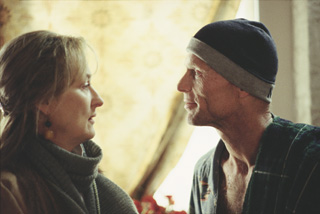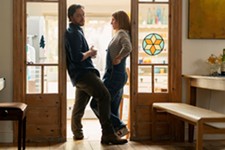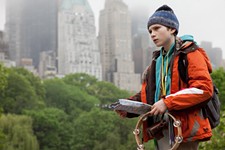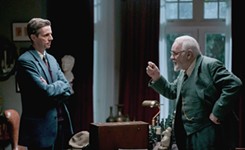
The Hours
2002, PG-13, 110 min. Directed by Stephen Daldry. Starring Meryl Streep, Nicole Kidman, Julianne Moore, Allison Janney, Ed Harris, John C. Reilly, Claire Danes, Toni Collette, Miranda Richardson, Stephen Dillane, Jeff Daniels, Jack Rovello.
REVIEWED By Steve Davis, Fri., Jan. 17, 2003
There's a mesmerizing, almost hypnotic rhythm to The Hours, the exquisite adaptation of Michael Cunningham's seemingly unfilmable Pulitzer Prize-winning novel. Most films simply move from scene to scene, but this one virtually glides with an extraordinary grace and elegance. The three ingeniously linked narratives of The Hours seamlessly unfold as one, each depicting a decisive day in the life of three women separated by time but connected in mutual experience. First, there's the writer Virginia Woolf (Kidman) creatively and spiritually suffocating in the 1923 London suburbs as she recuperates from a bout of debilitating depression and struggles with the genesis of her first great novel Mrs. Dalloway. There's also a despondent Laura Brown (Moore) reading Mrs. Dalloway in post-World War II Los Angeles, coming to the unthinkable conclusion that she can no longer bear her stultifying existence as wife and mother. And, finally, there is Clarissa Vaughan (Streep), a modern-day Mrs. Dalloway in the midst of preparing to give a party, a middle-aged woman existentially unraveling as she questions whether she has lost that indefinable something essential to human fulfillment. At its core, the beautifully realized film shows us human beings confronting the prospect of stolen lives and deciding whether to take action to alter their destinies. They are all slipping, in one way or another, and must choose whether to catch themselves midfall or continue in their descent. (In this regard, the film is a bookend of sorts to the other best film of 2002, About Schmidt.) Along with the narrative linkages to the novel Mrs. Dalloway, screenwriter David Hare (who hands down deserves a hundred accolades for this adaptation) and director Daldry employ a number of other inspired echoes throughout The Hours, all of which reverberate with a pristine and fluid clarity -- the ringing of an alarm clock, the early arrival of a guest, a passionate kiss between two women, even the simple cracking of an egg on the rim of a bowl. What is more astounding is how the film builds momentum and creates a sense of suspense with each illuminating resonance, immeasurably enhanced by a Philip Glass score that under other circumstances might be irritatingly monotonous. The triumvirate of performances at the heart of this film is simply remarkable. In a prosthetic nose that renders her unrecognizable, a deglamorized Kidman makes for a strikingly memorable Woolf. Given that the writer committed suicide by placing a large stone in her coat pocket before walking into a river and drowning in 1941, it is fitting that Kidman plays her as a woman weighed down by her literary genius, frustrated by her inability to use that intelligence to save herself from mental illness. Moore's portrayal of Laura is a trickier proposition, given the character's potential for cliché and the surface similarity of the character to her recent turn as another Fifties suburban housewife in Far From Heaven. But the quiet desperation that we see build within Moore's increasingly disconnected Laura is painfully real, and it's obvious to even the staunchest of traditionalists that she is not cut out for the life that she is living. Of the three actresses, Streep gives the most subtle and, in many ways, the most meaningful performance as Clarissa, a contemporary woman who anguishes about whether, in Woolf's words, she has looked at life in the face and known it. This may be Streep's most reactive performance yet on film -- in almost every expression, you can see all of it slowly sinking in. In one amazing scene, Streep ruminates about how the possibility of happiness grows more elusive as we grow older. For anyone who has ever pondered the matter, this scene -- and Streep's rendition of it -- will surely hit home. Near-perfect in every way, The Hours is a compelling meditation on making the most of what we're given in life. For some, it may be too cerebral a film experience, but for those who blissfully fall into its finely tuned modulations, The Hours is timeless.
A note to readers: Bold and uncensored, The Austin Chronicle has been Austin’s independent news source for over 40 years, expressing the community’s political and environmental concerns and supporting its active cultural scene. Now more than ever, we need your support to continue supplying Austin with independent, free press. If real news is important to you, please consider making a donation of $5, $10 or whatever you can afford, to help keep our journalism on stands.
Kimberley Jones, Aug. 27, 2021
Ten years on, and attempts to dramatize 9/11 are still a sticky wicket. This adaptation of Jonathan Safran Foer’s bestselling 2005 novel does itself no ...
Kimberley Jones, Jan. 20, 2012
Jan. 19, 2024
The Hours, Stephen Daldry, Meryl Streep, Nicole Kidman, Julianne Moore, Allison Janney, Ed Harris, John C. Reilly, Claire Danes, Toni Collette, Miranda Richardson, Stephen Dillane, Jeff Daniels, Jack Rovello









